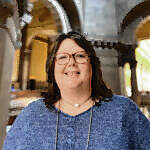When he was planning the concert season for the Columbus Indiana Philharmonic’s 2016-17 concert season, Maestro David Bowden could not have foreseen what a comforting and appropriately joyful gift to the community the music of last Saturday evening’s concert would be.
Given to an audience in a time when the spirit of the nation — and indeed the world — is filled with anxiety about the future and a time of division in need of healing, the concert was chosen completely from the music of composers “of our time.”
It included Eric Whitacre’s early and deeply personal “Five Hebrew Love Songs,” from 1996; Leonard Bernstein’s by now iconic paen to peace and unity, the Chichester Psalms, from 1963; and the American premiere of Swiss composer Carl Rütti’s crazily brilliant second organ concerto “Concerto for Organ, Strings and Percussion” from 2012.
The concert began with a beautiful performance by The Philharmonic Chorus and strings of Whitacre’s cycle of postcard-like settings of short Hebrew texts by his future wife, Hila Plitmann. The music celebrates the young couple’s newly found love for each other with evocative settings about nature and love summed up in the first line of the cycle, “A picture is engraved in my heart …”
In the piece, Whitacre confidently explores the compositional techniques which have been polished in his later style that is now loved by choruses and audiences around the world — a rhythmic playfulness in the first choruses (jazzy mixed meters), the painting of vast emotional and physical landscapes through the use of clustered choral sonorities, the depiction of nature through the rhythmic orchestration of the chorus singing nonsense syllables to create a tapestry of tone painting and unusual orchestral effects, such as the icy sounds of a winter day created by the strings playing col legno (bowing with the wood of their bows) which was juxtaposed with a beautiful melodic vocabulary of tender love songs sung by the chorus.
Even Whitacre’s unexpected insertion of the very personal, with an intimate and short solo beautifully sung by soprano Bridget Goodwin, reinforced the nostalgic remembrance of love first found in the midst of a healing universal landscape.
The Whitacre piece, however, served almost as an appetizer perfectly chosen to lead into the Bernstein Chichester Psalms performance. Bernstein’s cycle of Psalms settings, also sung in Hebrew, have by now become part of the canon of significant choral works from the 20th century.
The Psalms settings move from rhythmic celebratory praise (Psalm 108 and 100) to the child-like confidence and innocence of Psalm 23 (“The Lord is my shepherd”) juxtaposed with the undercurrent threat of violence from Psalm 2 (Why do the nations rage?), and finally to a poignant setting of Psalm 131 (“Lord, my heart is not haughty … surely I have calmed and quieted myself as a child that is weaned of its mother”) that grows into resolution with an unforgettable unison wordless melody of ascent.
Bernstein ends his work with a stunning chorale-like setting of Psalm 133:1 — a la the cantatas of Johann Sebastian Bach — that makes the entire work truly a prayer for our own times: “Behold how good, and how pleasant it is, for brethren to dwell together in unity.”
Bowden made a bold and appropriate decision to have the solo setting of Psalm 23, which is originally scored for a child soloist, to instead be sung by the excellent Concert Choir of the Columbus Indiana Children’s Choir under the direction of their artistic director, Ruth Dwyer, and to include them in the unison melodies of the third movement. Their pure and innocent singing perfectly juxtaposed with the fine playing of the orchestra and chorus — adding a new layer of meaning to Bernstein’s already significant message of peace and hope. The whispered comment of a concert-goer sitting behind me as the work finished said it all: “Breathtaking!”
Post-intermission came the anticipated highlight of the concert: organist Daniel McKinley’s homecoming performance of the American premiere of Carl Rütti’s “Concerto for Organ, Strings and Percussion.” The virtuosic requirements of this exciting piece were fully met with McKinley’s committed performance, First Christian Church’s noble Aeolian Skinner organ, and the extraordinary playing of the orchestra under Maestro Bowden.
Special mention goes to the extraordinary solo playing of concertmaster Alan Snow, percussionist Brian McNulty and principal cellist Sonja Kraus. The work is a joyous riot of colors and an eclectic mix of modern styles ranging from minimalism with its complicated phased rhythms, bird songs reminiscent of the music of Olivier Messian, jazzy multi-meter sections, even a passage in country-fiddle style. All of this is unified by the simplest of techniques — a stubborn single note pedal point which pervades the work, the development of a two-note motive that is exposed early in the second movement, and variations on one of Rütti’s own Christmas carols that make up the final movement. The result was a joyously accessible musical experience.
Leaving the concert, one once again appreciated the great contribution of the Columbus Indiana Philharmonic musical organizations and David Bowden to the culture and well-being of the community — daring programming of thoughtfully crafted and brilliantly performed music that uplifts the spirit in a time needing such healing.
Jan Harrington is the Chancellor’s Professor of Conducting Emeritus at Indiana University Jacobs School of Music, Bloomington.




